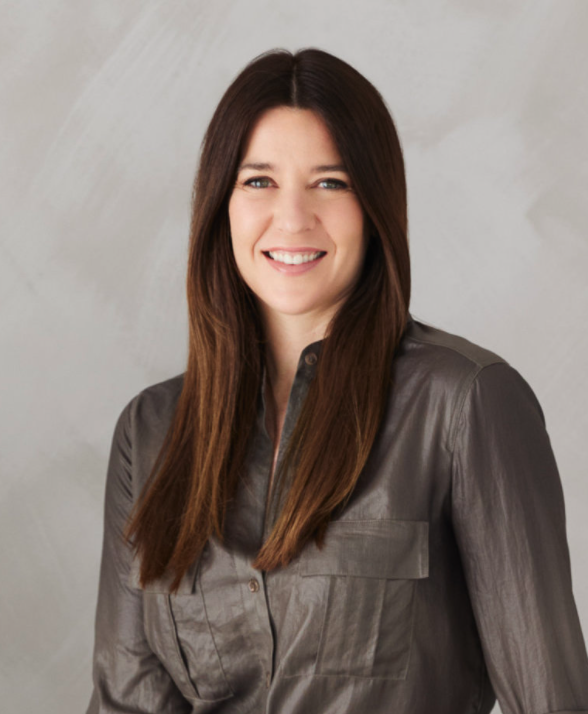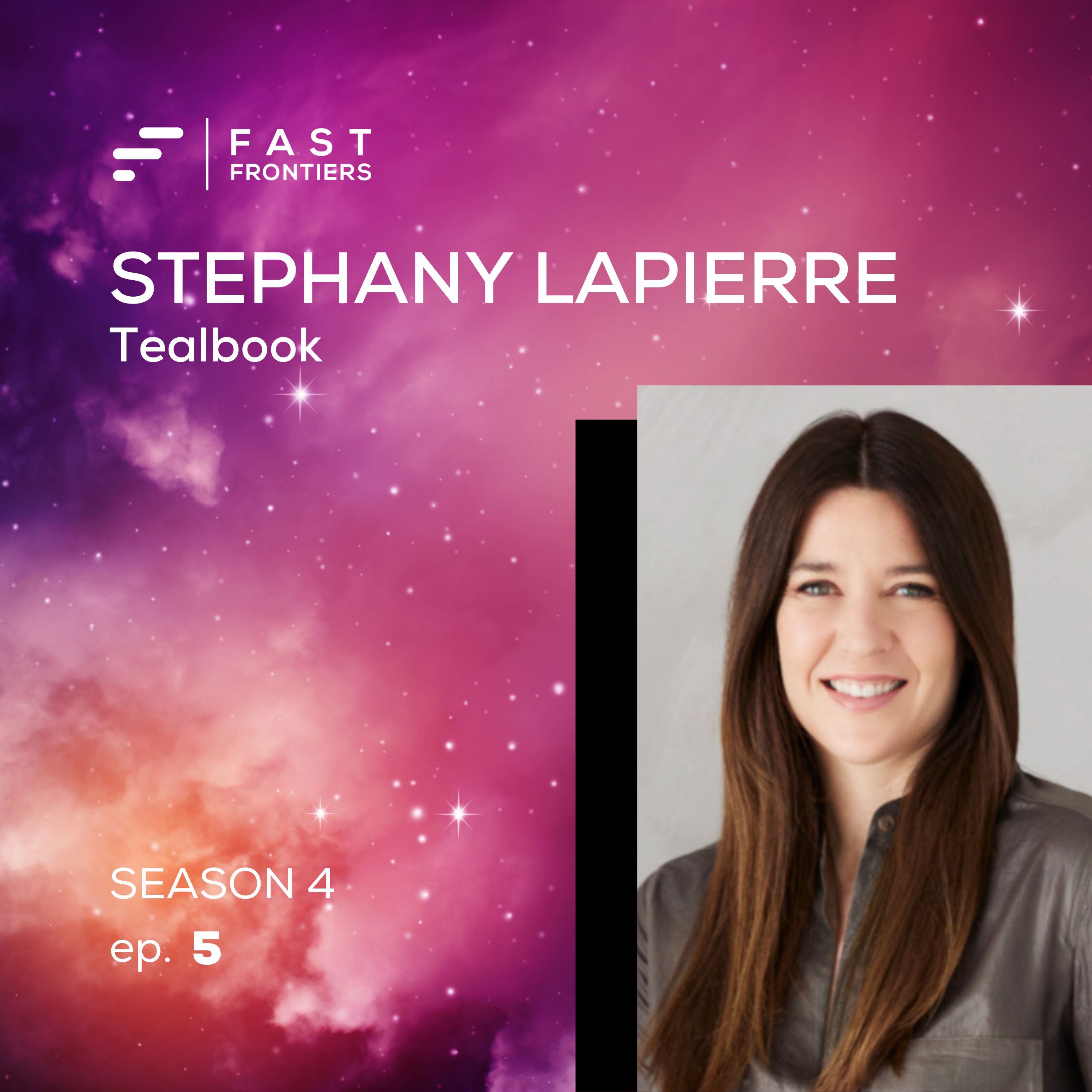S4 Ep 5. Stephany Lapierre: Tealbook
- 0.5
- 1
- 1.25
- 1.5
- 1.75
- 2
Tim Schigel: Welcome to fast frontiers. I am your host, Tim Schigel, managing partner of Refinery Ventures. In this episode, we're talking with Stephany Lapierre, founder and CEO of Tealbook headquartered in Toronto, Canada, and also a portfolio company of Refinery Ventures. In this episode, we're going to dive into how Stephany discovered the problem in supply chain procurement and it's all about the data. We also discuss the importance of getting the right kind of investors around the table, who just click it, understand where you're going and how they can help. The biggest theme or so what, I hope you take away from this conversation is the importance of finding the right market positioning. It takes time to get everything moving in the right direction. And how do you articulate your position in a way that makes everyone's hand go up in the air, wanting your solution. Please enjoy my conversation with Stephany Lapierre. Stephany Lapierre, it is about time we had you on Fast Frontiers. Welcome.
Stephany Lapierre: Thank you for having me.
Tim Schigel: Well, you've been busy, you've been busy. I'm so excited for you to share so many of your... So much of your story and some of the learnings that you've had. You're the founder CEO of Tealbook, but let's kind of start the beginning with a little bit of background on you and your journey to Tealbook.
Stephany Lapierre: Also, I'm originally from Quebec, I'm French Canadian. I think I've always been someone who's been looking for solutions and had a million business ideas over the years, but I started my first real business, helping companies find innovations. I found through my own career, working in large pharmaceutical companies, working in startups and I saw that there was a gap in enterprise that we're always looking for differentiating their company, differentiating their brand and finding innovation is really hard. And so I started this company called Matchbook, at the time, that was meant to match-make companies who were looking for innovation with suppliers that were delivering innovation. It was meant to be a lifestyle consulting business. And it did very well very quickly. I think the premise of spending so much time looking for innovative ideas, anyways, I was able to do a matchmaking service and the outcome of that service was always very positive. And it was either we were finding suppliers that had built something similar or address a similar problem with another client or bringing suppliers together to brainstorm on developing innovation. And that looked a lot like procurement and strategic sourcing. And suddenly my customers were these large companies who were trying to build a gap, build a bridge between procurement, which is at the time really looking to save dollars and the business was looking to spend dollars. So you're naturally going to see a lot of friction and they want to bring the two together. So they built a function of procurement called strategic sourcing, which was relatively new at the time. And so my firm started to build strategic sourcing functions for very large companies. And what we saw is that the friction came often out of not having the right information fast enough and having a lot of information in people's head, right? One of the stories that people like is the first time, the first ignition of Tealbook was I was sitting with a client at J & J. And before I left, she said, Steph, I need to introduce you to this amazing company. They're super innovative. They're these guys who just started this business and they made a huge impact on my brand and then goes under her desk and picks up a binder like this thick. It was not teal, by the way, some people ask was it a teal book, but it was a notion of this massive binder filled with business card. And she spent 10 minutes looking for the card of this amazing company because she couldn't remember the name because it was an acronym. And so I sat there for 10 minutes watching her. And I was like, this is crazy. There's someone who's bringing innovations or business that no one else across our organization is aware of because the information isn't in her head and in a binder. And I knew that the organization at the corporate level, they were trying to cut back their supplier base, which was in the hundreds of thousands by 50%. And how can you do that if you don't have information? You're going to naturally eliminate the ones they're not spending as much money with, which would then undo a lot of the work that's been done to encourage spending money with small diverse businesses, which are the pipeline for innovation. And so that stuck with me. I build my consulting business and over the next nine years, I kept seeing this major gap to me in the enterprise, all around lack of information that's readily available. That's insightful. That's relevant to the people using the information and as my business evolved and we started building procurement functions for hyper- growth companies, mostly biotech companies that would raise a lot of capital. They had a very short runway to launching their first global commercial asset. We would be building supply chain and procurement for these organizations and running into the same problems really fast. As soon as we start buying software by to be able to collect information and workflow data, it's for payments or sites for contract or if it's even for sourcing or compliance reasons, we start running into similar challenges that the data became sell really fast and there was no connectivity. So that's really what inspired me. I spend, I don't know, 10 years fighting the idea of building Tealbook, just thinking I have a very successful consulting firm, I've got three kids. There's no need for me to go and change the world of data and procurement. But after this much time not seeing the solution and seeing it so clearly in my head and no one was approaching the problem the same way. So initially I thought maybe I'm wrong. And then over the years I was like, no, actually I think I'm right. No one's thought of it. Or they thought of it. No one's actually done something about it. And I was like, well, I will. Why not me?
Tim Schigel: Why not you? Yeah, exactly. So, just describe to everybody just to level set, what Tealbook is and what kind of your current stage.
Stephany Lapierre: So what we do is we grab data. We use machines to grab data on every B2B company in the world. And so our machines go and find like what qualifies to be a B2B company. What about that company is interesting? What do they do? Where are they physically located? Who are they related to? Who their customers are? Who's most similar to them? What's their financial information? What are they certified for? Is it small diversity, sustainability, quality, GDPR, SOC 2, and we grab this information across millions of companies. And so that we essentially using machines, we've seeded this global network of B2B companies. And that allows us to work with large enterprise, typically have in the tens to hundreds of thousands of suppliers, we've made a huge investment in each of those companies, right by sourcing, by doing diligence, onboarding, them, paying them, maintaining this information, we enable that master data very, very quickly to be enriched. And our customers get to see more information about who they do business with across a hundred percent of their suppliers. And through algorithm, we can expand that well beyond their master data. So we essentially give them more better information autonomously enriched on who they do business with at a level that they couldn't possibly do through software, portals and services in a way that's connected. And through our software, we get to distribute that data across their systems. And so instead of integrating systems to each other and supplementing with services and inviting suppliers to a bunch of portals, Tealbook becomes that data foundation that powers the buy- side digital enterprise, unifying the systems, optimize a supplier base and empower people to make better decisions every day.
Tim Schigel: Perfect. And so you're decoupling, if you will, the data about your suppliers from the procurement and supply chain and ERP applications that companies use because companies, especially large companies tend to have, they may have four, seven different ERP systems-
Stephany Lapierre: 45.
Tim Schigel: 45.
Stephany Lapierre: They may have multiple modules because one of the slide, the first slide on her investment deck is the big fat lie, right? Software will fix your data and software companies have done a very good job selling the cloud technology will make your data more connected, will make your data better. And unfortunately the complexities of the enterprises, they have to your point multiple ERPs. And they often by acquisition or turnover of people, end up with a bunch of modules from different software and in the state that one software could fix the data would mean that it's only that software that owns the entire market and that's not the truth. It's very competitive. It's a huge market and more and more are coming to market are these digital niche solutions that are really easy to implement. And our customers are starting to look at how do I build a more interchangeable, flexible, best in breed ecosystem and not be locked into these massive enterprise wide system for a long period of time.
Tim Schigel: And so in the last couple of years, you've also amassed a great list of top tier clients. Want to just name a few of your better clients? Who can you talk about?
Stephany Lapierre: Well, the ones that are known, Gilead's been in the media. So I think we're good there. Standard and Poor's has been in the media for us as well. I'm trying to think who, Freddie Mac recently did the webinar publicly with us. So William Bagley, the CPO, there was a client. It meets our large organizations across multiple sectors. We did start in pharma biotech because that was my background. And a year and a half, two years, we had 90% of our customers were pharma biotech companies. And now it's only 25%. And so we massively diversified in the past year. And higher education, a lot of technology companies, mining construction, we've been very successful in financial services, information companies, consulting firms, and I'm missing probably a bunch, CPG, retail. And so it's nice to see that the solution is truly agnostic across sectors.
Tim Schigel: Yeah. The positioning that you have and were able to establish has been terrific. And in the interest of full disclosure, so refinery fund one we're investors, we invested 24 months ago, maybe through your senior VP of strategy, Matt Palackdharry, who's in Cincinnati. You're in Toronto. You were under a million in revenue at the time, still kind of working through positioning, which is exactly the stage that we like to focus on. The companies that are bridging that from seed to series A and positioning was a big piece of it, but also the idea of how to start preparing to scale. And you've had a ton of great experience in that, in our kind of a case study in how to do it, I think. So share with folks, if you will, your perspective that in terms of our conversation and how things of what you've navigated from then until today.
Stephany Lapierre: That's a loaded question just so much. But what I can say is that the importance of meeting the right investor at the right stage is so, so key because when we met within, you listened for two minutes and your eyes lit up and you got it. And then you got excited about the potential of the business and the fact that it was attaching itself to a fast growing market with this business intelligence and the procure tech supply chain side pre COVID. Right. And because you understood the vision, it got really exciting because then we started, I remember coming to Cincinnati before we got a term sheet. Then we locked ourself in a room. I don't even know if we ate. I don't remember getting out of that room. Matt and I were in the room. We dialed in other executive on our team to really dive into the business. And that was your diligence for us. It was like so valuable because we got to know each other, but even what we got out, even if you didn't not invest after that day, we got so much out of it. And then what I liked about our relationship is you're all focused on how do we get more efficient? How do we prepare for the next round, right? What do you need to look like at series A? And then we put that down and then what's aspirational? Why think limit yourself to this? Why not want to hit $10 million in revenue after year one? What's stopping you? And then you can start listing, what are the things that stopping you? There's a lot, by the way, we did not hit 10 million in a year. But if you start thinking this way, what could we do today if we were trying to hit 10 million? What needs to happen? And that opened our eyes to say like, why do we limit ourself to 3 million? Why not 10 and then what needs to happen? So that was a big piece of it because our entire executive team started thinking bigger. Another thing that you've implemented, we've now gotten much better and it's, it's been integrated into everything we do is OKRs. And that was hard. That was a big learning for us and something that was very useful going to series A. And so we look very different from the moment you gave us a term sheet to when you invested. So we closed that round in December, and then we were already raising series A, like, we're getting a lot of inbound requests from VCs in June, and that's partly we'd found product market fit. So we had repositioned the company from appearing like a software company, because when you build a data platform, your data's not good enough yet to be useful to the customer, right? So it's hard. The first two years is like really hard. And then you build workflows as a way for your customers to consume this data. And you're hoping they're going to contribute to making the data better. And the software was just not good enough to compete in the procurement space. So we're kind of trapped in this, like, no we're going to die if we don't figure out a way to find product market fit and it's really matte. And then when you start getting involved in helping us shape that positioning, and we shifted from being a software company to a data platform that powers a buy- side digital enterprise. That message landed incredibly well. And the market was starting to suffer from failures of implementation of these STP or large scale systems. And they couldn't achieve digital procurement success without having a data foundation. And so we were seeing the market coming our way. I don't know if you remember this, but that September I went to conference and all the CPO's of the largest companies in the world know, when I asked a simple question, do you feel you've got good quality and complete supplier data today? I'm not talking about transactional, not even spend data, I'm talking about all the information you need to know about who you do business with, and they all laugh, right. And that was the first time we positioned this way. And then I said okay, raise your hand. If you believe that having good quality and complete supplier data is absolutely critical to your digital transformation and a hundred percent of them raised their hands. And then I spent six hours at a table with a line up of CPOs from 4GM, Siemens, Disney, Pepsi, like all these companies coming in to say, this is a material challenge that we have and how do we now do this? And then it was on us to be able to show the path, which we're still refining, but we need to find the use case that was going to be repeatable for us, that we could deliver value fast enough to then have a repeatable sales process. And then we're now focusing on the expansion, what's a repeatable expansion process. But that repeatable sales process was critical to start showing for series A. And we were fortunate that the market with COVID was just so hungry for supply chain and data that we were like, it was a perfect storm of finding the right product market fit. COVID coming and highlighting so much challenges and dysfunction within supply chain and procurement that organizations, executive level, board level, just start focusing on what's the investment that we need to make to have better visibility and better quality data so that we can respond whichever way to market changes. And so we were fortunate to, we launched series A, two, three quarters ahead of schedule. Then we got a term sheet within four weeks and closed that round a year to the day that we close our round with you.
Tim Schigel: Yeah. I think it's a great example of getting the market positioning and market timing right, so that you feel this sort of pulling the market's kind of pulling you and part of it's because you had a very good intimate understanding of what the problem was. There wasn't as much about your solution as it was what the problem was. And when you had all those hands getting raised, you knew you hit it, you found the pain point that everybody had that wasn't getting addressed.
Stephany Lapierre: Yeah. And it's that slight shift, it didn't change our technology at all, which was the good news and when I say we pivot, I say it lightly because all we did is just shifted how we articulate our position. And then we made a commitment to not build more software that was going to compete in this e- procurement space, but focus on software that was going to improve the quality of our data and how the data was going to be consumed or distributed into system and into the hands of people. And that changed our whole, it brought a lot of clarity to our roadmap, what we needed to do to win this market. And we feel-
Tim Schigel: And it also seems like that positioning helps too with recruiting as well. It just helps so many different ways and it made it clear. It was clear, it was compelling. It was easy to understand, once you heard it, but going back to the OKRs for a second, when we are starting it out, I remember just stick to it, stick to it. You're not going to be good at it right away. What advice would you give other CEOs and founders who are thinking about implementing OKRs?
Stephany Lapierre: Same, I think the advice you gave us. It doesn't need to be perfect. You're going to reiterate, but you have to stick to it because at some point it will become natural. And it was really unnatural initially. And what I'd say now is we review OKRs every Monday. We update them and every quarter we rolled it out across the entire company and what people love about them, and when you get feedback from different employees across different functions, is that they can see how they can impact other department's OKR, by the way that we now roll it out as per function. But then we have the OKRs with all of the things that people are doing across all department under that OKR. So then you can see how we're all coming together to meet that one objective. And I think just starting, just get in a room. And you said that too, that a lot of the value is in having the conversation and what's most important. Now we had a very unusual sort of hype. The bigger goal this year was to raise series B. It's not typical. And if someone would say that to me and another company, I'd be like, that's just, that's not the goal. That's the outcome of being successful. But what we knew is that in order for us to look a certain way at series B, these are the things that we need to focus on. And for us, it brought clarity. So it was our decision to choose that. And we had a debate around, does that make sense? Even one of our board members like that should be your overarching goal is to raise another round, but we need to raise another round. And the investors that are going to be looking at us in that round are going to want to see certain things. What are those things that we can focus on?
Tim Schigel: That's a really good point that I think people often miss at understanding the difference between a process that you control and an outcome. And you're right. People naturally think, oh yeah, we're to control that series B, well, you can't necessarily control it. But what you could do is make yourself attractive to series B investors. And if you do a good job of it, you'll then get to pick which series B investor you want and pick the right partner who understands your business and can be helpful.
Stephany Lapierre: 100%. And I think we've done that. At the beginning, when you raise capital, people's like, choose your board members wisely and choose your investors really well. You're like, that sounds amazing. I just need money.
Tim Schigel: I just need money. Right.
Stephany Lapierre: Whoever's going to give me money. And I was so fortunate, a bit of maybe pixie dust around me, but for every round it's Michelle McBane. That was my first investor. And she's wonderful. She's so supportive, nothing phases her. We went through so many ups and downs together and she's like very calm and she's seen it all. And when we met you was all about like, let's get ready for scale. Let's elevate the team. Let's elevate the company so that you are best positioned to attract the best investors for series A. And with Jules Was interesting because we had other funds that were interested that were better known than RTP to us at least. But I talked to another founder and we were still lumpy at series A, right? So when we were raising series A, we missed our forecast by like a landslide. Luckily we could just close around before that, but we knew that we were not hitting forecast every quarter. We had one great quarter. We were still trying to figure out this repeatable sales process. We're trying to figure out how to be disciplined about how we were qualifying. We'd hired sales people, but we were spread so thin as an executive team. Plus we were fundraising and Jules was... One of the founder, told me that Jules's was just wanting to roll up his sleeve. And he would be the investor that would want to sit in a room with us and figure it out and would not expect us at this stage to be this perfectly well-oiled machine. That was really much part of and Jules is a later stage investor, right through Bessemer.
Tim Schigel: Jules was, you met him when he was at Bessemer, Jules Schwerin. And it was interesting because he said, Hey, good news, bad news. I'm leaving Bessemer. I'm leaving Bessemer. Good news is I want to leave-
Stephany Lapierre: In the middle of the process, he goes dark on us. And we're like, what's happening with Bessemer? Then, I got a call saying like, Hey, I left Bessemer. Bessemer is not going to invest. And I was like, what? And we thought this was a real lead investor. And he was like, but I'd like to lead the deal with RTP. And it was the right fit for us. And I think he's also, what do you need to look... Because he has invested through Bessemer and series B series C. He could start really helping us shape what we need to look like at that round. And so the value, although we were executing quite well, we hired really experienced executives across all functions. So I think we are pretty self-sufficient now in the way that we are executing, we need guidance, especially going into this round and Jules has been able to, and the rest of the board, but it's sort of, again, it's finding the right board members. And then I can talk about how I found my independence and then finding the right investor that you feel it's maybe not the best name in terms of what we thought at the time. And RTP is a fantastic find by the way, but we didn't have them in our top list because we didn't know they existed. But I think the difference between that and then having the right investor at the table, right? So, and now we're talking to top tier funds that were on the list that are very interested to even preemptively come into this round.
Tim Schigel: I often talk about kind of the first law, which is capital follows growth. Here in Toronto, you're growing, you've got the market positioning nailed. Have you seen any limitation to raising capital from coastal VCs or others because of geography?
Stephany Lapierre: Actually, the first time in a long time, I heard from a fund who's very interested in this round, they never invested in Canada and they need to understand that better. And I was like, oh, because in the last five years, a lot of the U.S. VCs have been very interested in Virginia market. There are amazing companies, amazing technology. We've got crazy talent. Engineers is like, we've got top engineers from UofT, from Waterloo. It's a big hub for AI. So also lots of towns, a lot of companies, U. S. companies are coming here, which is making a little tougher on startup, Canadian startups. But it's a very hot market. I'd say that unfortunately for me, I was not successful in raising capital in Canada when I started. I think my vision was really big, unusually big for Canadian company. And they needed to see more proof points. I was not known to the investment community. There's this woman who has three kids, who's never a tech company, knows nothing about AI coming up with this crazy idea. And I don't know that that exuded enough confidence for the Canadian investors traditionally is more conservative and traditionally, even when we raised the last round, we had term sheets from Canadian investors that were less than half the valuation that we were getting from U. S. investors. You're so far even in the Canadian currency, I'm like, I'm sorry. And they're like, they couldn't even like comprehend. They were limiting themselves to not know how big this market is. And I think there's a bit of that in Canada. Unfortunately, it's not true for everyone. We've got amazing companies like Shopify and many others who have been more secretly successful, right. Building amazing organization, or maybe not as famous as Shopify, but we do have a lot of successes here, but I tried in Canada initially because this was my community and I did want initially to have Canadian investors. I was successful with StandUp Ventures in IF who came in the seed round and BDC followed on with Michelle Scarborough and the women in tech fund. But I went that route, right. I looked at okay, women in tech types of funds. I'm a woman, founder would a big vision. And so I'm going to play on the fact that I know this market really well. I know the problem. I bootstrapped the first couple of years and I had some angel investors, and I had big customers. Right. I had Biogen. I had like some, we landed J & J like back in the early days. And so, but still, it was like never enough for here. We need more proof point, more proof points. And I think in U. S. investors were just more willing to take a shot.
Tim Schigel: But it is. it is tough in the early days, right? When you're still kind of believing in this story and the vision and the rumor. But now you have the data. Play a different story. It removes all the boundaries, but that Michelle McBane, StandUp Ventures focused on women led startups. She's been on Fast Frontier. She is fantastic. She introduced us to Bernadette Butler, CEO, and founder at Storytap, which we also invested in. She was great. Let's talk about that for a second, as a, your experience as a female founder and CEO about your challenges and your opportunities.
Stephany Lapierre: And we were talking about this before. I was like, what has been the challenge? I'm like, nothing. What has stopped you or been in the way? And I say nothing. And I have to go back in time a little bit. I can say this with a lot of confidence today. It's easier because we have the data. And you said before to me, investors will get on a plane if you have the right metrics. They won't know anything about your business, but if you have the right KPIs, they'll jump all over the deal. And it's so true because that's the first slide of our series B deck is just our KPIs. And then there's something there that's worth me spending more time in who the STEM-based mass is. Right? And so in the early days, I don't think it has so much to do with me being a female. When I think of it is I'm an investor and I have thousands of companies to choose where I'm going to put my capital. What makes me think that you're going to win, especially in the early days and there's risk with every company. But when you see a woman who's never, in my case, I'd never built a tech company and had children and was a single founder. That's high risk, right? So I don't know if it's the fact that I was a female so much as my risk profile. And I think as an investor, I'm also very critical. You got to show me that you have what it takes to build this company. And there's a lot that could have happened, right? My kids could have gotten sick, whatever, and my situation could have changed, but you need to know that the person will do whatever they can. If I'm going to give you money, you're going to do everything you can in your power to make this company successful. And that was my commitment to investors. And so I was successful in raising capital, but I think the advice I gave, because I mentor a lot of women, founders is how do you look to the investor? And there's a lot that can be done on both sides, but a lot of it is de-risk yourself, right? Build a team faster, get angel money faster, like all those things because now it's going to show that you can execute that you can attract talent, that you're going to de-risk yourself by having other executives at the table that are adding different skillset to the company. So I think it's more that. And then in terms of being a female founder, I think it's a huge advantage for attracting talent. And there's several people in my company that have articulated that they joined Tealbook because I was a woman founder. There's a slightly different flavor, and this is not coming from me directly. So from the team around empathy, around really caring for the people, it's challenging. We're moving really fast. This is not just... It's not for just anyone. Recently, we had someone from Shopify plus speaking to the team about like, this is really hard. Only 1% of people get to do what you do. Do you want a nice job? We'll help you find a job at a bank. This is hard. And people won't understand, your family won't understand what you're doing, because unless you experience it, if you can do it with care and you care about the people that work in your company, they feel it. It's not just we're talking about it, but they actually feel it as far as the culture and how you interact with them. And I think that makes a huge difference. And recently, when about a year ago, we attracted a VP of sales, Yami and she said, what did you tell your boss? And she goes like, because they did not want to lose her. Right? She was a superstar. And she said like, I really want to work for a female CEO. And it was nothing that guy could have said because the company was, didn't have a woman CEO. She said, I really want to learn from her. And I want to know what that's like. And I want to be inspired by who is leading and I think as a side effect, we ended up attracting quite a diverse team. We're 50/50 in our employee, we're 50/50 on our board. And that's pretty special. Even the engineering team, I believe we're 38, which is lower than what I'd like. That's a little harder to attract down there, but by finding women in that team, they're ultimately attracting other women to join the team as well. So I think it has huge advantages from a talent and building a culture perspective.
Tim Schigel: And the culture you've built in our building is fantastic. The amount of collaboration on your team, plus the high level of accountability and performance, which I think is the thing that gets people, anybody excited and engaged, right. When people are accomplishing great things that they didn't think was possible, they're going to be engaged. They're going to be excited because they're all growing, you're growing, they're growing.
Stephany Lapierre: It's transparency, right? You have to be transparent. It's constructive or, and the more I want to hear, everybody wants to hear good news. I want to know the stuff that's not working. And that's what we have to ask the question, when we're all reviewing, like what are the risks? And what's not working that we could do better? And recently we had a bit of an explosion in one of our function and it was, we were blindsided. We're growing so fast. We closed 60 new logos. And these are big companies, right? 60 new logos. And we ran into a bottleneck and we figured we didn't have quite the right skillset on the delivery side. But it was all about the ability to give feedback and receive feedback and take action and learn from it. How fast can you do that? And it was hard. It was hard for the team, it was hard for that executive. But very quickly, within four weeks, we're seeing a huge transformation and we all have learned from it. The entire company leaned in, put the right resources, collaborated to get us back to a stable state. And then all the improvement that are being made is extraordinary to watch.
Tim Schigel: Yeah. So it doesn't feel like it at the time, but it's a blessing in disguise, right? The odds of doing everything perfectly on execution are extremely low. You needed to go through, you needed to hit your head against the wall and kind of mess up so you can learn and be that much better next time. And so having that learning mentality in your group and being open is key. And actually setting no care framework helps you do that too. Right. Because it teaches people how to kind of put emotions aside and just be objective about, did this happen or not happen and why?
Stephany Lapierre: Yeah. Actually inaudible that, even from the beginning very well tied back to OKRs and values. We have four core values and those two things is what we leveraged to measure people. And it's been, it removes sort of the emotional side in some ways, because you can have a very pragmatic conversation and if the people's not living by those values or demonstrating that they're able to put more effort towards a value that they may not be already meeting. And then the OKR is this kind of inaudible, if you're not meeting, you should know that you're not having your OKRs. And if you're not showing us what you can do to make sure you hit them, it's okay to recognize problems. It's what you're going to do about the problem. That's more important.
Tim Schigel: Right. Awesome. Well, there so many nuggets there that you shared today, Steph. I really appreciate you coming on Fast Frontiers and sharing with our listeners and very excited to watch the progress at Tealbook.
Stephany Lapierre: Yeah. It's exciting times. Very exciting. And thank you for your support. It's been pretty amazing to work with you and learn from you.
Tim Schigel: Absolutely. All right. Stephany Lapierre. Thank you very much. Thanks for listening to Fast Frontiers. If you like our show and want to know more, check out our website, fastfrontiers.com. If you enjoyed this episode, please share it with others and give us a rating and review on your favorite podcast platform. Join us next week when we bring you a unique episode, our friend and fan of the podcast, Joe Kaiser at Mercato Partners, we'll be switching seats with me to share our version of a man behind the mic conversation. The Fast Frontiers podcast is brought to you by Refinery Ventures. Our producer is Abby Fittes. Audio engineering by Astronomic Audio, marketing content and social media support from Content Callout and our podcast platform is Casted.
DESCRIPTION
Today we're talking with Stephany Lapierre, founder and CEO of Tealbook headquartered in Toronto, Canada, and also a portfolio company of Refinery Ventures. In this episode, we're going to dive into how Stephany discovered the problem in supply chain procurement and it's all about the data. The biggest theme or so what, I hope you take away from this conversation is the importance of finding the right market positioning. It takes time to get everything moving in the right direction. And how do you articulate your position in a way that makes everyone's hand go up in the air, wanting your solution?
Today's Host

Tim Schigel
Today's Guests







